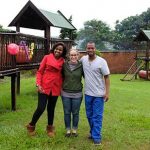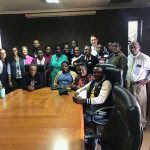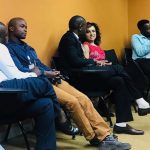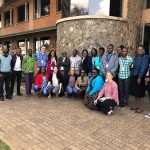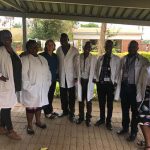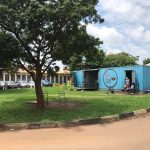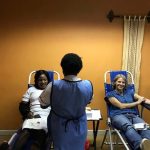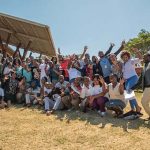The story you are about to read is part of an ongoing series about Texas Children’s efforts to care for women and children around the globe. The series highlights Texas Children’s efforts in Malawi, one of the 17 countries we currently serve. Today’s story focuses on the Texas Children’s Global Health Corps and how its members support the hospital’s mission.
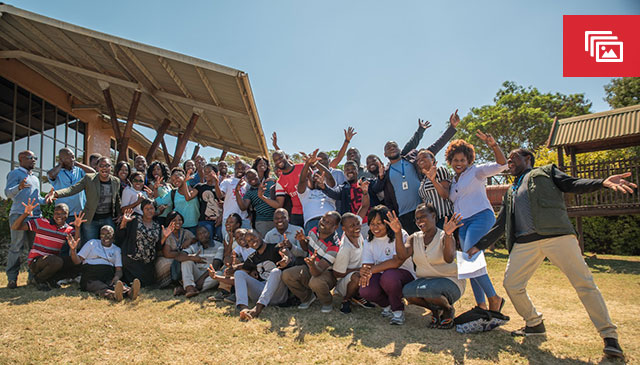
The Baylor College of Medicine International Pediatric AIDS Initiative at Texas Children’s Hospital (BIPAI) Centers of Excellence are supported by Texas Children’s Global Health Corps and the Dr. Kelly Descioli Global Child Health Residency.
The partnership brings doctors to countries where we work to learn, teach and help provide much-needed clinical services. Residents spend one year of their four-year residency program at one of our global health sites in Africa.
The Texas Children’s Global Health Corps is a successor to the landmark Pediatric AIDS Corps, founded by BIPAI in 2005, which has trained and sent about 150 pediatricians and family doctors to Africa to help scale up medical programs for children and families affected by HIV/AIDS. BIPAI, thanks in large part to its partnership with the Texas Children’s Global Health Corps, now provides HIV/AIDS treatment to about 320,000 children and families – more than any other program worldwide.
In Malawi, the partnership with the Global Health Corps has brought several pediatricians to the Center of Excellence there, including Amy Benson and Allison Silverstein, who talk in the following Q&A about their experience treating children with HIV/AIDS and other aliments in a low-resource setting.
Why did you choose to become involved in Texas Children’s Global Health?
Amy: After college, I was in the Peace Corps in Bolivia, and because of that experience, I knew I wanted to become a doctor and work in a low resource setting. Working in Global Health Corps has helped me reach that goal. It’s exactly what I want to be doing.
Allison: When I was in medical school, I took a year off between my third and fourth year and worked in Rwanda and Zambia doing policy work and helping to build research capacity. It was powerful but I wanted to be able to help clinically. I interviewed at a lot of residency programs but most connected with the model at Baylor and Texas Children’s. The way these organizations are truly building capacity and setting up this huge infrastructure to provide unparalleled care is how I ended up in the Global Health Corps.
Describe what you do in Malawi with the Global Health Corps.
Allison: Most of my time is spent in clinic at the Center of Excellence with pediatric HIV/AIDS patients. A typical day begins with a staff huddle that includes going over caseloads and doing a little singing and dancing to get us off on the right foot. Then, we see patients. Some of them are coming to the center to fill their medication or for a routine checkup. Others are sick and not feeling well, and we do our best to provide them with the best possible care. We see about 100 patients a day.
Amy: In addition to caring for patients at the Center of Excellence, I spend one week each month working at Kamuzu Central Hospital, the largest hospital in Lilongwe. At the hospital, I see children who have HIV/AIDS and have either been admitted to the hospital due to complications of the disease or who have been newly diagnosed. In addition to treating their immediate medical needs, I help get them hooked up with longer term services.
How has your work with the Global Health Corps made you a better doctor?
Amy: When I go outside of my comfort zone, it helps make me a better person and a better doctor. Being able to help take care of people and learn about people who have many different needs and struggles, helps me to understand people in a different way and to be more empathetic. And, that makes me a better doctor for sure, no matter where I’m working or who I’m working with.
Allison: I’m more thoughtful in my decision-making. When you don’t always have accessible imaging or the labs that you want, you have to rely on your clinical skills – your history and physical – and bring it all together to treat the patient.
Is there a patient or an experience that has made a significant impact on you?
Allison: I treated a 6-year-old patient who had recently lost her mother to tuberculosis. Not long after the mother’s death, the girl’s aunt brought the child to us with symptoms consistent with gastroenteritis. While treating her for that, we discovered the girl, like her mother, had tuberculosis. The girl’s aunt was devastated thinking she was going to lose her niece as well as her sister to the disease. But, she didn’t, and she was so unbelievably thankful for the treatment and attention we provided to that child.
Amy: What’s left an impression on me is the network of caregivers at the COE who work together to help these children and their families. For example, I was working in the hospital one day when a mom took her very sick baby home before she was ready to be discharged. One of our community health nurses knew where the woman lived, went to her village and convinced the mom to bring her child back to the hospital where the child could receive medicine for her newly diagnosed illness – HIV/AIDS. She made an effort to understand the mom and the reasons she had left and to offer the support that the mom needed to return. Without people like the community health nurses, that child might never have come back.
For more information about Texas Children’s Global Health Corps, click here. To make a donation to Texas Children’s global health efforts, click here.


